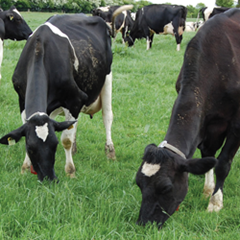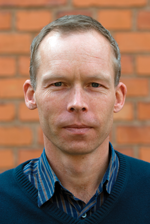Agriculture: learning from Sweden
 Representing Ireland at the recent International Federation of Agricultural Journalists (IFAJ) Congress in Sweden, agendaNi contributor Richard Halleron had a unique opportunity to meet a range of the country’s politicians and academics.
Representing Ireland at the recent International Federation of Agricultural Journalists (IFAJ) Congress in Sweden, agendaNi contributor Richard Halleron had a unique opportunity to meet a range of the country’s politicians and academics.
Themed ‘Solutions for a green future’, this year’s IFAJ Congress provided Sweden with a unique opportunity to highlight what its leading agri-environmental academics and government ministers regard as the key sustainability challenges facing the planet and the role which international agriculture must play in allowing humanity to come up with the required solutions.
Johan Rockström, Professor in natural resource management at Stockholm University, lost no time in confirming that the world is now at a crucial tipping point, citing the reality that the Arctic will become ‘ice-free’ within the next few years as a case in point.
“We are now losing Arctic ice at the rate of 7 per cent per annum,” he further explained. “This is further evidence of the fact that the world is heating up. Moreover, ice reflects heat while water absorbs it. The reality is that the further erosion of the Arctic ice sheet will speed up the global warming process. This is basic physics in action.”
Professor Rockström went on to point out that we are now entering a new geological era – the anthropocene – a term coined to reflect the more than significant impact which man’s activities are now having on the Earth’s ecosystems.
For the uninitiated, Johan Rockström is one of the world’s leading opinion-formers on all matters relating to the protection of the global environment. He is an internationally recognised scientist on global sustainability issues and led the recent development of the new ‘planetary boundaries’ framework for human development in the current era of rapid global change.
 Significantly, Johan Rockström believes that agriculture will play a crucial role in delivering a sustainable future for humanity.
Significantly, Johan Rockström believes that agriculture will play a crucial role in delivering a sustainable future for humanity.
“Let’s start with the basics,” he stressed. “The world’s population will reach 9 billion by 2050. That train has already left the station as the number of young women required to make that figure a reality are already born.
“So we are looking at a 50 per cent hike in the number of mouths to be fed globally over the next 35 years. But, in reality, food output must increase by 70 per cent during the same period, so as to ensure that everyone living on this planet can meet their nutritional needs in full.
“In order to meet this requirement, we need to introduce international policies which put soil quality, water quality, habitat retention and the maintenance of biological diversification as key priorities.”
In practical terms, Johan Rockström believes that agriculture must deliver a solution based on the concept of ‘sustainable intensification’.
“And time is running out,” he stressed. “Arable land is a limiting resource and we need to ensure that we make best use of that which is currently available to us.”
Significantly, Professor Rockström holds strongly to the view that international agriculture must become a ‘carbon-neutral’ industry well before 2050, if it is to meet its sustainability targets.
“Every step in the food production and processing chain must become more efficient,” he continued.
“And, yes, genetically modified crops may well have a role to play in all of this. If they allow farmers to produce food more efficiently, without endangering biodiversity and our natural habitats, then the technology should not be discarded on a mere whim.
“The next 40 years will see a ‘green revolution’ take effect within international agriculture. The reality is that the industry’s current business model, based on the use of fossil fuel energy and fertilisers, many of which are also derived from petrochemicals, does not have a future.”
For those of you who think that Johan Rockström is a voice crying in the wilderness: think again. Last October saw the European Commission publish its proposals to reform the Common Agricultural Policy. To the surprise of many agri-analysts in this part of the world, ‘short-term’ food security measures did not feature at all in the suggestions contained therein. Instead the concept of ‘greening’ was given centre-stage.
The final CAP deal will be agreed sometime next year and, no doubt, changes to the original reform document will be secured. However, the Commission in Brussels has made it quite clear that the concept of ‘greening’ will be maintained. This means that, beyond 2015, farmers throughout the EU will receive support payments reflecting their commitment to improve water quality, soil quality and biodiversity.
Obviously, the powers-that-be in Brussels have been listening to Professor Rockström and his colleagues in other similar ‘think tanks’ around Europe. For their part, farmers are not making money by producing food using the techniques and systems currently available to them. So the prospect of changing focus may not be as daunting now, as would have been the case even five years ago.
This latter point was one picked up by Sweden’s Farm Minister Eskil Erlandsson. “Sweden is committed to the development of a bio economy,” the Minister confirmed.
And within all of this, agriculture will play a pivotal role. Farmers will be to the fore in creating new foods, new energy options and developing a range of new ‘bio-products’ that will have a wide use throughout industry.”
Turning specifically to the upcoming CAP reform process, he added: “We want a Common Agricultural Policy that is ‘greener’, more animal-friendly and provides for a fairer trade competition between EU member states.
“I also want to see a stronger focus on rural development, which must reward the entrepreneurship demonstrated by active farmers.
“Good research will be crucially important for agriculture in Sweden moving forward, as will be the means by which the results of this work can be communicated to farmers. This is why ‘demonstration’ farms are playing such an important role with Swedish agriculture. We want to build on this for the future and will be drawing down rural development funds to make this happen beyond 2015.”
Sweden’s farming sector already has a strong conservation and animal welfare ethos. This has recently been recognised by the European Commission, courtesy of a unique support payment for Swedish pig producers, which reflects the exacting animal husbandry standards which they aspire to.
In essence, agriculture in Sweden has fully bought into the belief that farming must have a sustainable future. This is epitomised by its approach to Brussels and the focus which the industry places on rural development support measures as the means by which the future needs of the sector can be best met.
Here in Northern Ireland, however, the emphasis remains firmly placed on securing the highest possible level of direct payments for farmers from Europe. One could argue that both industries are poles apart in terms of they see their futures being secured. But which industry is more fully in tune with the future needs of this planet’s fast-growing population? The next five years will tell a very interesting story.






